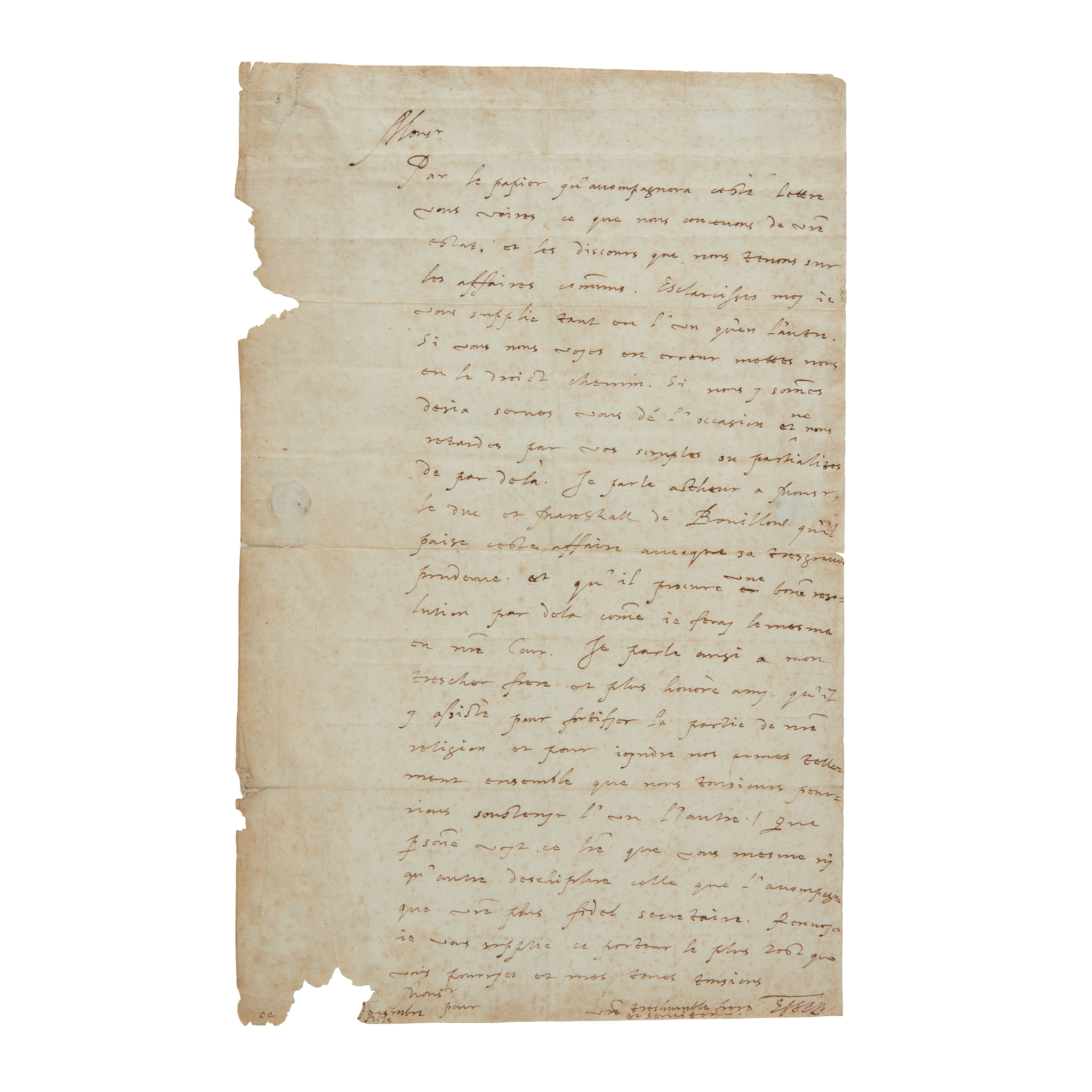Essex, Robert Devereux, 2nd Earl of (1565-1601)
Autograph letter signed to Henri de La Tour d'Auvergne, Duc de Bouillon, December, 1596
£5,292
Rare Books, Manuscripts, Maps & Photographs
Auction: 07 February 2024 from 10:00 GMT
Description
in French, on single sheet (30.5 x 19cm), 25 lines, signed ‘Essex’, verso addressed in Essex's hand ('A Monsr, Monsr le duc de Bouillon, Mareschal de France'), endorsement recording date of receipt as 23rd March 1597, and two red wax seals with silk tassels, seal tear costing part of date
Footnote
A few months after the pyrrhic victory of the Cadiz raid, Essex engages in clandestine correspondence with his principal ally in the lost cause on which he had staked his political career, that of a protestant triple alliance with France and the Netherlands.
Essex appeals to Bouillon as both the Marshal of France and ‘my dearest brother and most honoured friend’ to help ‘strengthen our religion and to join arms such that we may always support one another’ (‘pour fortifier le partie de notre religion et pour joyndre nos armes tellement ensemble que nous tousjours pourrions soustenyr l’un l’autre’). Enclosing another letter in cipher (not present), he seeks urgent clarification of Bouillon’s opinion on the matters contained and asks that no one read either document except Bouillon and his secretary. It is possible that the letter in cipher is that now held at the Morgan Library (ID 126940), addressed to Bouillon by Essex, dated to November/December 1596, and while only partially deciphered is described as concerning negotiations with Spain.
As early as 1587 Essex had informed the future Henri IV and Duc de Bouillon (then Henri of Navarre and the vicomte de Turenne respectively) that he hoped to join their fight for the protestant cause in France. In 1591 he joined Henri in an Anglo-French expedition to Normandy which ‘cemented a lifelong bond between the two men and confirmed Essex’s deep Francophilia’ (ODNB), though its success was hampered by the jealous interference of Elizabeth I. In 1593 Essex was appointed privy councillor and sought to influence policy in the direction of stronger support for Henri, despite Henri’s conversion to Catholicism in the same year and the great annoyance of the queen, who was determined to withdraw all remaining English troops from France. By 1597 Henri IV himself sought peace with Spain, putting a final end to any hopes of a triple alliance.
Essex’s posthumous reputation has endured numerous fluctuations, but from the 1950s historians began to show that he developed a coherent strategy for the war with Spain, while more recent research has drawn attention to his often overlooked work in intelligence gathering.
Provenance:
1) Sotheby's, Catalogue of the Renowned Collection of Autograph Letters and Historical Documents formed by the Late Alfred Morrison of Fonthill, 15th-19th April 1918.
2) With Maggs Bros.
3) Sotheby's, Valuable Printed Books, Autograph Letters, Historical Documents, 13th June 1939.
4) Sotheby's, Valuable Historical Manuscripts including Science and Printed Books, 28th March 1983, lot 47.

